#koreanfilmjottings
i knew this film was going to be depressing. depicting the quotidian everyday of a housewife’s life, kim jiyoung, born 1982 sheds light on the daily injustices women face. even if the daily injustice is on its own tolerable, the accumulation of tiny cuts can suddenly make life unbearable.
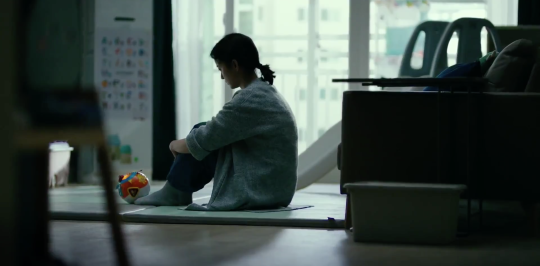
jiyoung, played by the reliable jung yumi, is not okay. she is chronically depressed, constantly aggravated by the marital bliss that surrounds her and that she is expected to feel grateful for. in trying to meet societal expectations of her as a daughter-in-law, a wife, a mother, a daughter, jiyoung loses her sense of self and the courage to pursue her dreams. jiyoung summarises this the best at the end of the film, where she tells her therapist, “sometimes i am filled with gratefulness and joy when i look at my family and the love around me. but sometimes this suddenly makes me feel trapped. i try to escape, but i run into a wall every route that i take.”
none of the micro-aggressions of gender inequality surprised me in this film. none at all - if it surprised you, you probably belong to the privileged group that society’s structure protects. from how jiyoung’s father tells her to cover up more to prevent boys, who cannot help themselves, from sexually harassing her, to how jiyoung’s mother-in-law’s kneejerk reaction against her son going on childcare leave, to how jiyoung’s girlboss mentor at work had to retaliate against a chauvinistic colleague indirectly through a joke. these are ordinary incidents that happen every day, every where. it’s only now that it’s captured in excruciating detail in film.
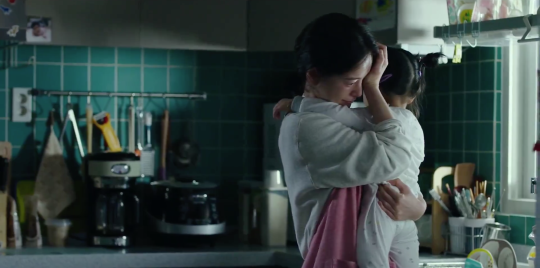
and this is not to blame men. yes, yes, not all men. and definitely not gong yoo, who shows us that even husbands with the best intentions can fall short, as they are inhibited by the inevitable unawareness by not being birthed as females. when jiyoung was upset by his family’s pressure on them to give birth to kids, his (well-meaning) response was “let’s just do it - we have to do it anyway, so why not do it now? i’ll be good. i’ll come back early, i’ll help change diapers, i’ll earn money.” when jiyoung replies “but things will change for me. i will feel suffocated”, he doesn’t understand, and not for the lack of trying. but because he continually tries to put himself his wife’s shoes, he finally does somewhat understand the sacrifices she has had to make, and starts making them in return.
does this film provide any resolution? apart from demonstrating the importance of men stepping up in the household, i saw two ‘outs’ that the film posited. (i) women should continually to press at pockets of opportunity they are presented with, and (ii) other women should have their backs when they are doing so, even when their sons eventually marry the women they love.
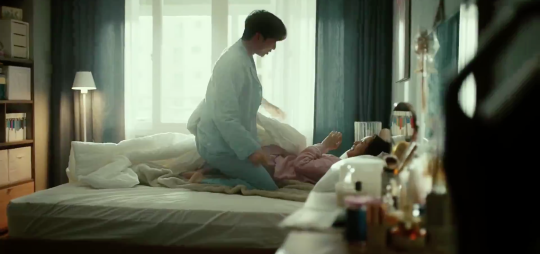
if i were to put a stern critic’s hat on, this film would be an 8-9, because the source material was already so strong and cemented in reality that botching the adaptation would’ve been harder than pulling it off. but because i can’t think of another film that so realistically portrays the modern woman’s uphill challenges, kim jiyoung, born 1982, to me, deserves a place amongst korean film classics.
when the book first released in korea, and later the movie, it gathered a lot of controversy. many keyboard warriors reprimanded the book for inciting societal instability and promoting feminism, and even burned photos of celebrities who had endorsed this book. casting gong yoo and jung yumi was a conscious decision to give this film and its feminist perspective a larger voice, but even gong and jung weren’t spared, and to date the book continues to rile up the anti-feminists. this simply shows that the film’s ending is optimistic and rare in reality, and that we have a long way to go in holding the hands of the many kim jiyoungs that exist in your society and mine. –9/10
films are so much more enjoyable when you are in the right mood for them. a coronavirus-induced lockdown and some career changes has made me contemplative and yearning for something to anchor on. which is why little forest was especially delightful to watch.
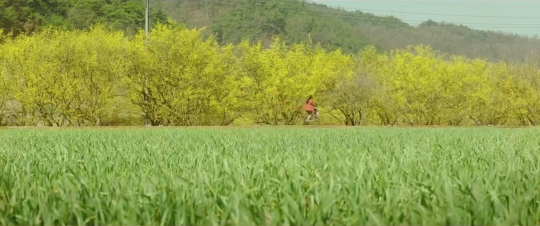
inlittle forest, kim tae-ri plays hye-won, who returns to her rural hometown after failing to become a teacher in seoul. although she initially claims to only stay for “four days or so”, she stays through the four seasons while doing farm work, reconnecting with her childhood friends, and reconciling with the bittersweet memories of her mother, who had suddenly left her when she was in high school.
little forest does a brilliant job of advertising simple countryside living. while some parts did come across as unrealistic, i must admit that i was compelled. often city dwellers over-compensate to find some grounding and resonance with countryside living (pottery, homemade kombucha and cold brew teas are only some examples). but in the world where hye-won and her friends live in, this way of life is modestly taken as daily routine. we see hye-won’s home warmly furnished with handmade wheel-thrown wares, well-stocked with muslin cloth and mason jars, and i cannot lie that i felt no jealousy.
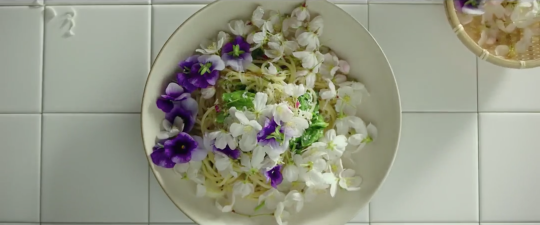
more so than others, food featured strongly in this film. little forest fed us with many recipes that comprised only natural ingredients across the four seasons - potato bread, azuki bean-topped rice flour pancakes, plain-fried cabbage with sujebi. (i am sure there is a compilation of little forest recipes somewhere on the web.) when hye-won winces remembering the convenience store bentos she ate while living in seoul, i winced with her too, knowing just how industrial those could taste. crucially, hye-won’s passion for authentic natural cooking is imparted from her mother; while she reconnects with countryside cooking, she is forced to face the memories of her mother in the kitchen.
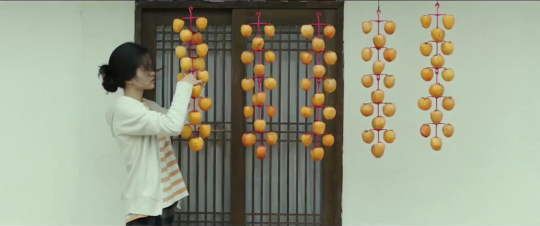
what resonated the most with me was the farming practice of ‘field planting’. i am not sure of the exact english term, but in essence it refers to the transferring of germinated seeds from a smaller environment to a larger one, so the seeds are given more space to grow. jae-ha (ryu joon-yeol’s character) had quit his job in seoul to return to farming in the countryside, and he explained to hye-won, “i left because i do not want to live a life set up by others. in the workplace i am rarely given the space to act freely. i am just waiting for payday. what was the meaning in that?” while it could sound flippant and romanticised, i resonated especially with that sentiment because of the recent career changes that i made. when jae-ha called hye-won out, that she was just keeping busy to avoid having to think about bigger problems, i even teared because it was as if he was talking about me and the everyday. where is my space to settle and grow?
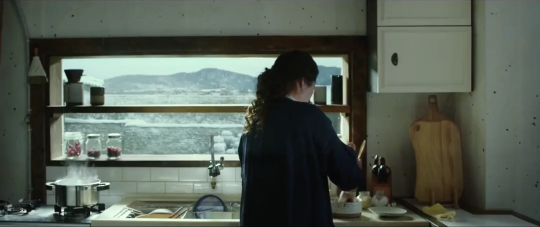
little forest felt so japanese in tone (unsurprisingly so, since the source material was a japanese book of the same name), which i enjoyed because i like japanese fiction. in fact, this film reminded me in particular of the travelling cat chronicles, because both the book and this film lusciously depicted the beauty of the seasons in the countryside. regardless of setting, though, i think the strength of little forest lies in that its themes and heart is universal and easily transposable. who doesn’t, even occasionally, yearn for a simpler routine, a meaningful existence, and catharsis?
little forest is probably the second korean film to move me on a personal level, after house of hummingbird. and unsurprisingly so too, because they are both helmed by female directors. i am always looking forward to more films by female filmmakers, and while i hadn’t heard of this director before, her other films look very interesting and sensitive, so they will definitely be checked out soon. if you are a fan of korean entertainment in general, you’d be able to recognise certain actor favourites (kim tae-ri, moon so-ri, ryu joon-yeol, jin ki-joo). this film probably also contributed to the rising popularity of camping in korea, as well as variety shows such as little cabin in the woods.
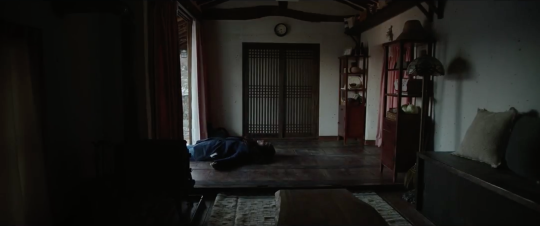
i’d encourage people to watch this - lockdown or not, but even more so during lockdown. it may lead you to look harder for the simple comforts that already exist within your homes, or it may lead you to re-examine something more. – 9/10
i decided to watch a hard day, being a fan of jo jin-woong and lee sun-kyun, and seeing how it had multiple cannes accolades.

a hard day is about a corrupt cop (lee sun-kyun) who extorts money and an even more corrupt cop (jo jin-woong) who smuggles and distributes drugs in illegally-run nightclubs. when lee sun-kyun accidentally hits and buries a man jo jin-woong is after, lee finds himself threatened by jo, who forces him to unearth and deliver the wanted man.
as you can probably guess from the above description, most of what happens in this film doesn’t re-invent the wheel of this genre. except for the fact that lee had buried the man together with his mother in her coffin, and the sequence that led to that joint burial was ingenious. lee, who had dumped the body bag in his car trunk, had to somehow move the body to the hospital morgue and then into his mother’s coffin, all in 15 minutes. this borderline ridiculous act is achieved by connecting the body bag and his daughter’s radio-controlled toy with a string, then using the toy’s remote to pull the string - and later the body bag - through the hospital’s vents. by keeping the scenes fast-paced with little elaboration, the director (who also directed netflix’s kingdom) forces the viewer to keep up.
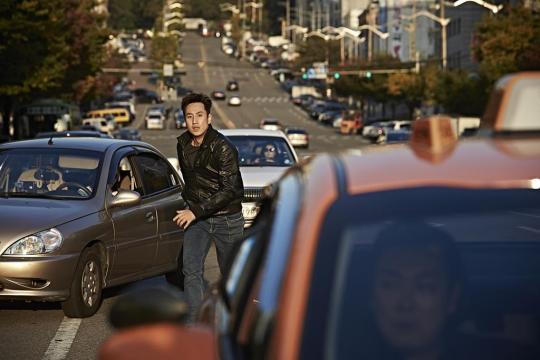
granted, there are there small bits of typical korean film humour in a hard day (e.g. jo assaulting lee in the office on the pretext of “oh i thought he was someone else”, lee half-heartedly investigating the hit-and-run case he had committed). but these moments fell somewhat flat, and do not contribute to the movie’s tone. instead, the director’s willingness to move the plot along quickly made a hard day a much more pleasant watch.
unfortunately i think action thrillers about corrupt cops are, by nature, fairly limited in plot content and character development. as films of this genre go, it does an above average job by keeping the pace fast and action scenes taut. – 7/10
